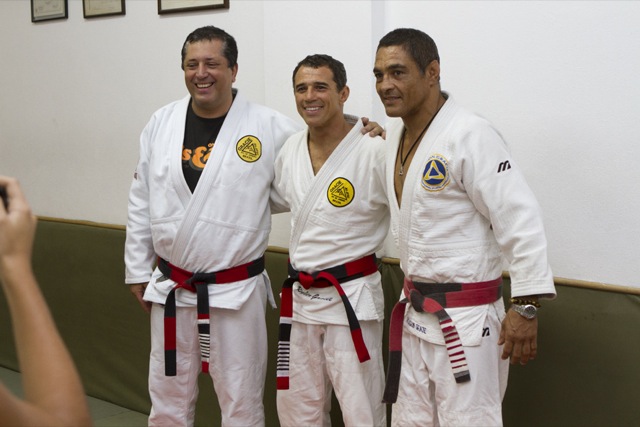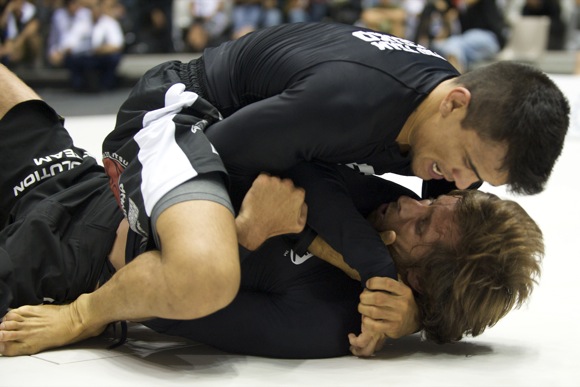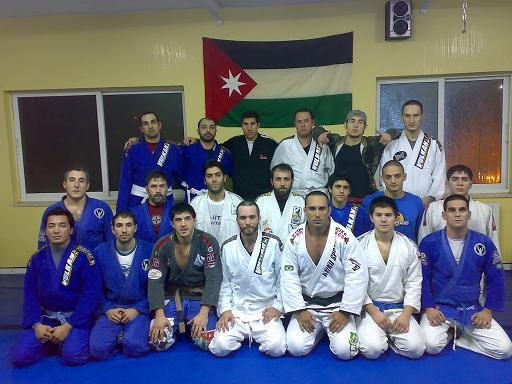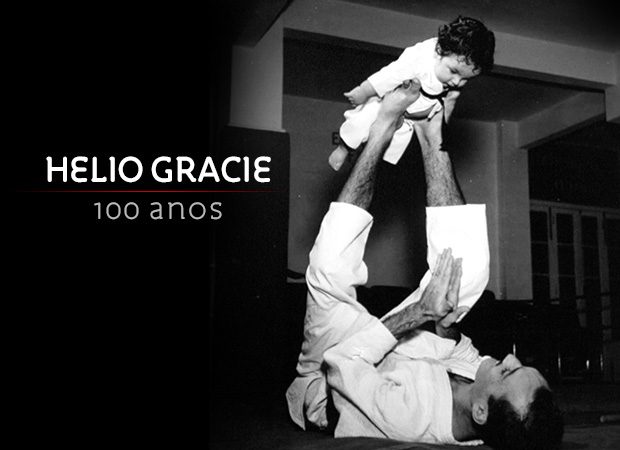
Royler, still a Jiu-Jitsu black belt, gets the party ready. Photos: Gustavo Aragão.
There’s no journey involving greater patience and determination than that of a black belt in Jiu-Jitsu. Maybe just getting across the city of Rio de Janeiro during rush hour traffic on Friday. Even so, the mats at Gracie Humaitá academy were packed at 8:30 pm last Friday night, when the GRACIEMAG.com team rolled in.
Just one man was missing. The man. “Want me to call him again?” a student asked Royler Gracie, who was waiting for his brother Rickson to show up for the red-and-black belt delivery ceremony.
Royler still remembers the day he was promoted to black belt. It was right there, in that same dojo just at a different wall, early in the 1980s. “I got it from Professor Helio,” he says with pride.
Upon receiving his red-and-black belt in the presence of his wife, Vera, his daughter, and a number of his “children” and brothers from Jiu-Jitsu, Royler is visibly moved, especially when addressing the women in his life—his wife and four daughters. “I already had three daughters when I was world champion. What my career is a lesson of is that there’s always time to start; you are the author of your own destiny.”
Even retired, “with no desire to compete anymore,” as he says, Royler expounds on some lessons and moments of inspiration, now with a red-and-black belt around his waist.

Royler adjust the red-and-black Jiu-Jitsu belt after receiving it from brothers Rolker and Rickson. The ceremony ebbed between laughter and tears.
1. SET GOALS FOR YOUR JIU-JITSU AND GET ORGANIZED
After Rolker Gracie opened the ceremony, Royler’s older students—from Vini Aieta to Breno Sivak to Rickson Gracie, who showed with his foot bandaged and a fierce bout of the flu—were called on to make speeches.
“A good portion of the Gracie family went to the USA, and perhaps we wouldn’t be here if they hadn’t. But we know how important our mission is, that of staying behind and holding fort in Rio de Janeiro, and now we help strengthen Jiu-Jitsu culture and healthy eating by being a a part of the city’s culture,” said Royler. “Brazil’s culture!” added someone else. World culture, to which we can attest.
Someone brought up the determined and organized side of Royler, who would always take not of goals, training plans and positions to teach on paper, and he would fulfill them always.
2. PERSISTENCE SET JIU-JITSU PRACTITIONERS APART FROM THE REST
Called on to speak, our GMA Bruno Panno, head instructor at Gracie Sydney, did a good job of illustrating what Royler is like as an educator. “When I was a kid, my mother would threaten to tell my dad on me, and I didn’t care. So she’d threaten to tell Royler, and I tremble with fear and stop what I was doing right away,” he recalled. “Of the 40 students who started with me, only I made it to black belt. And that’s what distinguishes us from the rest, that persistence it takes to make it to black belt that we take with us to other aspects of life.”
3. ROYLER: TECHNIQUE, GRIT, HONOR AND LOVE
With each speech made, a facet of Royler’s career was brought to the forefront. For being of slight frame, for years he was considered the most technical competitor of not just the family but of world Jiu-Jitsu. For his temperament and looks, there were many who felt he was the spitting image of Grandmaster Helio Gracie. For the grit and courage he showed on the mat, he inspired a number of aces from the new generation.
Once Rickson had finally gotten through the Rio de Janeiro gridlock, he took his turn to speak and mention another side of Royler. And both the speaker and the addressee shed tears.
“There was a time in my career, in the 1990s, when I’d go to Japan to fight alone, since my family felt at the time that it needed only to support only those fighting in the USA. Royler went against the grain and went with me. To me he isn’t just a symbol of honor and technical refinement, he’s a symbol of brotherly love that I will carry in my heart the rest of my life.”

Rolker, Royler and Rickson at Gracie Humaitá dojo
What do you think, GRACIEMAG.com-reading colleague, what moment from Royler’s career made the biggest impression on you?



